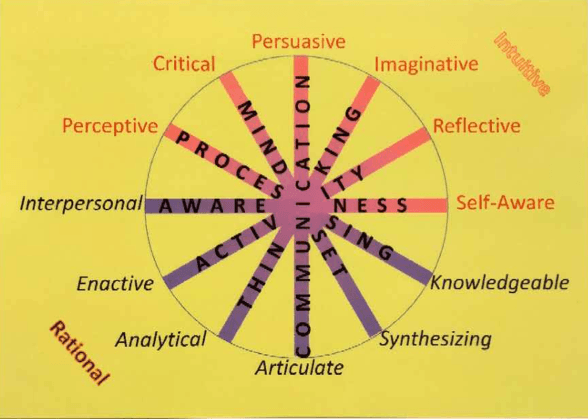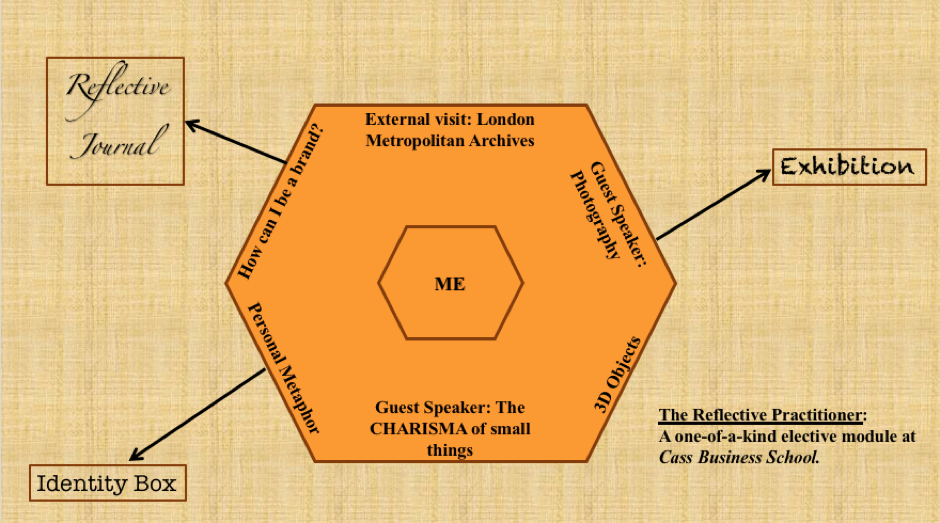This is a guest post from Aurelie Zhu, a 1st year Business Studies student at Cass Business School, that looks back on her participation in the ‘Reflective Practitioner’ module.
Contents
What is the module about?

The module is designed to enhance and develop Intuitive qualities which are essential to any successful managers of our time.
And to do so our lecturer, Angela Dove introduced each week new activities, themes that helped us in awakening these intuitive skills.
As you can see in the picture Rational skills are also represented. This is because Rational and Intuitive are two dimensions of management that cannot be dissociated. That being said, the Intuitive side is often set aside and neglected while it might be the key to be a well-rounded, versatile and outstanding manager.
I chose alongside 20 fellow students this elective module because we were drawn by its uniqueness. Indeed, unlike more “traditional” modules where we have to attend lectures and tutorials, our weekly “lecture” is more workshop oriented and interactive, to develop skills that will be essential in our future career.
Reflective Practitioner in action:
Our 11-week module focused on awakening and stimulating our intuitive skills and among many other in-class activities we had to produce three main pieces of coursework.
A reflective journal: each week we had 6 pages at our disposal to fill with what happened during the workshop or even outside. The aim is to sit down, reflect on our take of recent experiences. Also, to develop our visual literacy by expressing ideas that goes beyond words and a 2D approach.
This journal is invaluable for us because it allowed us to record thoughts, ideas as well as any doubts or mistakes. In addition, this journal is a tangible imprint that we leave for our own benefits. We can learn from our mistakes and we are able to have new insights regarding new challenges because we can connect the past and the new.
Identity Box: we were given a box that look very much like a pizza box and we had to customise it in a way that would represent ourselves. Each side is dedicated to one of our many facets and the main rule is to express ideas visually using a limited amount of text. In other words, we had to make a maximum impact with a minimal use of words. The challenge here was substantial as we faced a blank canvas that we needed to design in a way that would do justice with the ideas we had in mind.
Exhibition: Our entire module culminated towards our exhibition (which was on Wednesday 11th April 2018) that showcased our exciting journey. Eleven pairs of students were assigned an exhibit to produce. This tested our ability to plan, design and run an exhibition from scratch with the resources that we had in our disposition.
My take on this elective module:

The picture above represents how I would sum up this exciting, enriching and challenging module. The inner hexagon shows where I was at the beginning of the module and the outer one where I am now. My field of vision has broadened thanks to the different topics, themes and activities introduced each week. And I see the reflective journal, identity box and my contribution to the exhibition as an extension of myself. I talked about tangible imprint a little earlier and those extensions are the proof that will stay with me.
My reflective journal:
I would love to talk more about the process of making my identity box and the exhibition catalogue I co-wrote with a fellow reflective practitioner student but I care for your eyes so I will focus on my reflective journal instead. I want to share with you a few extracts from my journal. I thought that it would be a good idea to share my reflections at the end of week 1 and contrast it with my reflections written at the end of week 10 where I reflected on my experience from week 1 to 10.
Reflections week 1:
“The first time I heard about the Reflective Practitioner module was at the beginning of last term, a student which was a year ahead of me took this elective module. This fellow student was quite enthusiastic but combined the words “journal”, “creativity” and “originality” in the same sentence. My very first reaction was fear and panic because I know I am the least creative/artistic person on Earth. The extent of my drawing skills is very limited and stopped at stick drawing. At that point in time, I just started university and barely knew what an elective was, so I shelved it in a corner of my mind.
In one of my modules last term, we were asked to write a weekly deep reflection about what we did during our seminar sessions. I really enjoyed writing these reflections. As I am rereading them now to refresh my mind, I truly understand why they are priceless. It stated what I believed, my opinions and my thoughts. And I can tell that this weekly activity kept me grounded and offered me a clear vision of my stance, which direction I should go and what I should pay attention to.
In addition, writing down my reflections allowed me to look back at them and try to connect my past experiences with the new ones I am facing. It left an imprint and evidence that I should not repeat the same mistakes I made.
I am excited and at the same time intimidated by ‘The Reflective Practitioner’ elective module. The former because the idea of following a non-traditional, interactive module and be part of a group who aim to develop skills that are essential in our future career is really appealing to me. The latter because I don’t know if I will be good enough and if I will be able to embrace what the module is trying to teach us.”
Reflections from week 1 to 10:
“I don’t know where to start, it is a bit overwhelming to reflect on the past 10 weeks. One thing for sure is that it is the module that I enjoyed the most at university so far and I am not saying this to get a good grade. Keeping a reflective journal, designing my identity box and writing the exhibition catalogue among the other activities in class took a lot of time and effort but I enjoyed the challenge.
At the beginning of the module, I was truly concerned about being able to complete the journal in a way that would fully embrace what the module is trying to teach us. I tried to put into practice what was introduced during the weekly two-hour class and I can say that I learned many things about myself and became aware of things that I would have not if I didn’t choose this module.
If I had to list out things that I learned on a personal level, it would go like this:
-
To never give up because no matter how hard it looks at the beginning of a new task, I have always found a way to overcome any obstacles such as lack of inspiration, self-confidence about being able to produce an acceptable work to show to the public or the lecturer. I know it is not perfect (and there is no perfect answer for these kinds of coursework but rather good or bad) but in my eyes it doesn’t matter if it is not well-received because I tried my best and I am proud of the work I did.
-
I think Nelson Mandela quote ‘It always seems impossible until it’s done’ summed it all for me. This module pushed me in doing things that I never thought I would be able to do. I tried to draw by looking up on the Internet how to draw this or that (at an easy level of course) and it looks credible (in my eyes at least). It also opened my eyes about photography and I now see it under a new light. Like a librarian who would never write on a book, I never thought about cutting a photo but it is oddly quite satisfying. It enabled me to try out and play with the shapes I cut the photos into. I then tried to make a collage of photos and it is actually a powerful way of expressing myself visually. By placing the photos in a certain way, I tried to tell a story without words.
-
I actually gave out this advice to my classmates when they were thinking about designing their identity boxes and what to write in their journals, I said: ‘Think about what you have (as resources) and what you can do with it’. This is my technique on how I approached the different coursework in this module. I armed myself with some coloured pens, masking tape, stickers, my own photos taken in the past plus the one taken by my classmates during the module, some coloured paper and with all the resources I had I asked myself: ‘what can I do with them?’ A lot of element in my coursework was found by accident. I stressed ‘by accident’ because I realised that sometimes good ideas come by accident. The idea is to keep going forward, keep finding ways to overcome any problems to find a solution.
-
This module set the foundation and offered me a clear picture as to what is expected of a modern manager. The module put an emphasis on the Intuitive qualities that any successful manager need and now I can wrap my head around these qualities thanks to the activities and coursework of this module. I learned by doing and it is truly the greatest way to remember things.
-
I am thinking that this module influenced how I am looking at the outside world, I now pay more attention to what I see, look out for the small details and try to make sense of them. Besides reflecting on what happened during class, this journal allowed me to question and think more deeply about the things that inspire me or puzzle me.”
Conclusion
I think that being creative is within everyone’s reach. You just need the opportunity and means to take the time and let your imagination and creativity flow. We need to constantly stimulate our mind to create things that will be unique.
I am glad and grateful to have had the opportunity to choose this one-of-a-kind elective module. If you want to be challenged and pushed past your comfort zone, be given tools to help you understand yourself and be able to communicate and persuade effectively: this is for you. Thank you for reading and if you have any questions, do not hesitate to leave a reply.
